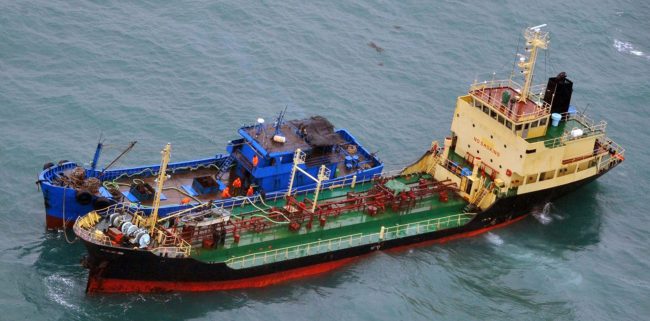A Royal Canadian Air Force patrol aircraft landed in Japan on Saturday ahead of its deployment to help monitor North Korean maritime smuggling activity.

The CP-140 Aurora, along with 40 Canadian personnel, will participate in a multi-national effort to monitor and counter North Korean smuggling activities designed to evade UN Security Council sanctions.
Foreign Affairs Minister Chrystia Freeland and Defence Minister Harjit Sajjan said in a statement that Canada was committed to supporting sanctions designed to pressure North Korea into abandoning its nuclear weapons program.
“To that end, the Government of Canada is today announcing its participation in an initiative to counter North Korea’s maritime smuggling, in particular its use of ship-to-ship transfers, in contravention of UNSC resolutions. Canada has deployed a Canadian Armed Forces (CAF) maritime patrol aircraft in the region to assist in this effort, in addition to assets being provided by the United States and the United Kingdom,” read the statement.
READ MORE: World must ‘not assume anything’ when it comes Korea peace deal, Freeland says
The term “ship-to-ship transfer” refers to the movement of cargo between ships positioned adjacent to each other while at sea, a tactic widely believed to be used by North Korea to hoodwink the international sanctions regime.

Get breaking National news
In February, Japan’s foreign ministry released photos purporting to show three separate instances of North Korean vessels indulging in ship-to-ship transfers.
Two of the instances involved tankers from Belize and the Maldives, while the third involved a vessel of unknown nationality.

North Korea’s ship-to-ship transfers likely involve the clandestine importing of oil and gas products, according to Simon Palamar, research fellow with the Centre for International Governance Innovation in Waterloo, Ont.
“That’s probably what people are looking for right now… crude oil, gasoline, jet fuel, refined petroleum products,” Palamar told Global National correspondent Abigail Bimman.
Canada and its allies hope that by clamping down on North Korean ship-to-ship transfers, they can boost the effectiveness of sanctions that have forced the country’s crude oil imports to well below its annual need.
- Queen’s University students stranded in Doha after Iran attack shuts down airspace
- Attack on Iran triggers global flight disruptions, impacts Canadian travellers
- WWE Hall of Fame ring belonging to wrestling legend recovered after stolen
- Carney calls for protection of civilians as U.S., Israel strike Iran
The surveillance mission comes in the wake of the historic inter-Korean summit, which saw North Korean Supreme Leader Kim Jong-Un meet with South Korean President Moon Jae-in, ahead of his expected summit with U.S. President Donald Trump.
WATCH: North Korea, South Korea pledge peace during landmark meeting

The Japanese government welcomed Canada’s participation in the mission, saying in a statement that the Canadian aircraft will be based in the U.S. military’s Kadena air base, located on the southern island of Okinawa.
Canada’s Department of National Defence says the Canadian military will remain in Japan for as long as required — given South Korea’s patience and willingness to play the long game in negotiations with its nuclear-armed neighbour, experts say that could amount to years.
— With files from Global National correspondent Abigail Bimman








Comments
Want to discuss? Please read our Commenting Policy first.